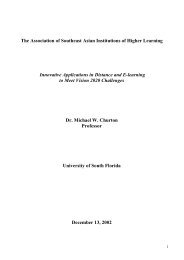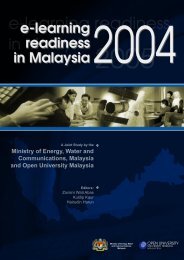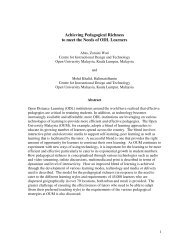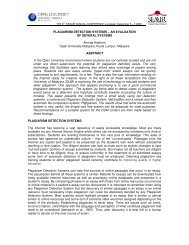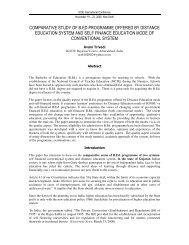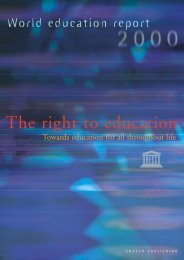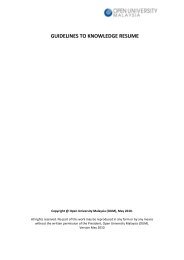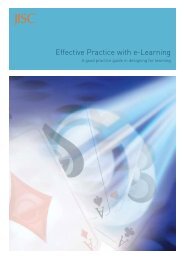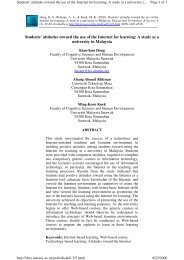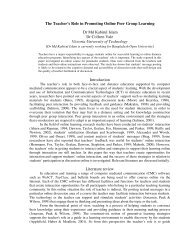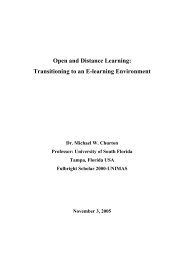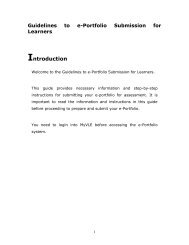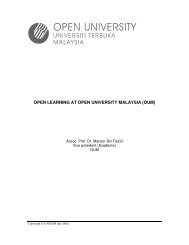lifelong learning and distance higher education - Asia Pacific Region
lifelong learning and distance higher education - Asia Pacific Region
lifelong learning and distance higher education - Asia Pacific Region
- No tags were found...
You also want an ePaper? Increase the reach of your titles
YUMPU automatically turns print PDFs into web optimized ePapers that Google loves.
POLICY CONSIDERATIONS• Many states have developed policies designed to encourage firms, or even compelthem, to finance their employees’ <strong>lifelong</strong> <strong>learning</strong>. One such programme is theUnited Kingdom’s “Investors in People”; another, the “Employer’s one per cent”enshrined in French law, which obliges firms to devote one per cent of their budgetsto staff training, at the request of the employees.• Individual Learning Accounts: an interesting idea, in which the State allows eachindividual an overall sum for his/her adult <strong>education</strong>, to be used as the individualthinks fit in view of his/her own needs <strong>and</strong> opportunities: either at the start ofworking life or later on, <strong>and</strong> either all at once or in instalments. Individuals wouldthus be in control of their own <strong>lifelong</strong> <strong>learning</strong> plans. The idea is attractive, <strong>and</strong>appears simple; but if such a scheme is adopted, is certainly not easy to solve theproblems of managing it.• The accommodation of an adult clientele with timetable constraints <strong>and</strong> limitedavailability means that the university needs to adapt to their requirements: lecturesneed to be organised <strong>and</strong> rooms made available outside normal hours; the workload<strong>and</strong> arrangements for teachers who work in these areas need to be revised; libraries<strong>and</strong> administrative offices need to be accessible outside the opening hours fortraditional students; <strong>and</strong> so on. Are we perhaps moving towards a round-the-clockuniversity? This brings us back once more to the problem of human <strong>and</strong> operationalresources.• Partnership <strong>and</strong> the sharing of resources are becoming a necessity for <strong>lifelong</strong><strong>learning</strong>: parliaments set political objectives <strong>and</strong> provide for administrativearrangements; institutions construct their “on dem<strong>and</strong>” range of courses toaccommodate learners’ needs, <strong>and</strong> issue qualifications; businesses specify their needs<strong>and</strong> make their financial contributions; <strong>and</strong> local authorities provide knowledge abouttheir regions’ job market, <strong>and</strong> arrange for <strong>education</strong>al venues such as Internet accesspoints, so as to ensure that everyone can access the technology required for <strong>distance</strong><strong>learning</strong>; <strong>and</strong> so on. This is a division of labour made necessary by the complexity ofthe issues faced nowadays.• The need for quality is fundamental, if <strong>lifelong</strong> <strong>learning</strong> is not to be a second-rateor even marginal sector within <strong>higher</strong> <strong>education</strong>, to avoid the two-tier university<strong>and</strong> certifications that are less recognised in the labour market than others:involving the institution’s most skilled teachers in <strong>lifelong</strong> <strong>learning</strong>; bringing the twotypes of clientele, undergraduates <strong>and</strong> adult learners, as close as possible; avoiding“one-off” certificates with no recognition among properly-designated officialdegrees; <strong>and</strong> ensuring strict quality assurance measures of all online teaching,whether national or international. Right now, UNESCO <strong>and</strong> OECD are workingtogether to prepare Guidelines on “Quality Provision in Cross-border HigherEducation”.19



